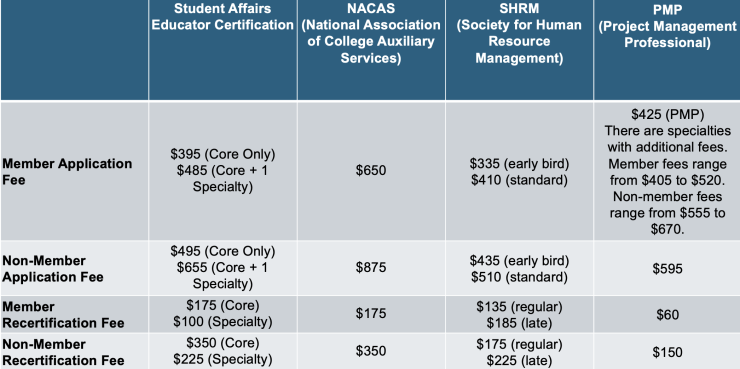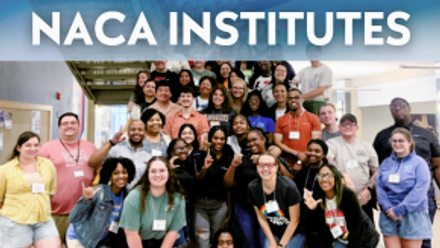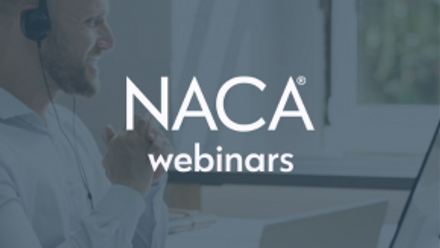Is Certification a Money Grab?
Reposted with permission. View original post at Higher Education Consortium for Student Affairs Certification.
“Student Affairs Educator Certification sounds like a money grab!” If I had a nickel for every time I heard this comment about certification, well, I’d have a lot of money. Given the frequency of which I’ve read this misconception on social media the last few years, it may be helpful to shed some light on the costs associated with establishing and operating a certification program.
Before delving into this topic, it’s important to emphasize what often gets lost in conversations about certification costs—and that is the value that these voluntary programs bring to various professions. Certification programs serve an important role across multiple professions in recognizing knowledge, incentivizing professional development with trends and new topics, providing recognition, and supporting career advancement. In the first two years of Student Affairs Educator Certification, professionals earning these credentials, as well as supervisors, have spoken to certification’s importance in further legitimizing experience, instilling confidence, as well as demonstrating knowledge and competencies especially for student affairs educators who came to this work through non-traditional pathways. Certification is an investment in the field, specifically in professionals themselves and the students they serve.
The significant costs involved in developing and maintaining these programs are often misunderstood. This article provides details about financial elements of certification as well as its benefits to individuals and professions. Designing, developing, launching, operating, and evolving a top tier professional certification program costs money. Let’s break that down by some major expense areas.
Program Development and Start-Up Costs
Student Affairs Educator Certification has been the focus of discussion for decades among professional associations, graduate faculty, and administrators. Several market analyses have been conducted into whether, or not, a voluntary certification program would be welcomed by the profession. (Check out the Background Development section of our webpage for more info.) The results of multiple analyses repeatedly demonstrated interest in certification by practitioners and supervisors.
Given these results, seven student affairs professional associations collaborated to develop Student Affairs Educator Certification. This process took several years; engaged consultants, practitioners, and graduate faculty; and involved creating an entirely new organization—the Higher Education Consortium for Student Affairs Certification. This new organization has its own staff, websites, databases, and infrastructure. (Check out the Program Development video on our website for even more info.)
As you might correctly assume, the initial market analysis research to identify student affairs industry impressions of certification as well as designing, developing, and launching a comprehensive certification program consisting of seven credentials was significant. Research from the Institute for Credentialing Excellence, a major certification professional association, suggests the initial development phase for a certification program can range from $50,000 to $150,000 depending on the complexity and scope of the certification. Significant development and organization start-up costs are also true of our program.
Examination Costs
Robust certification programs include an extensive, high-quality exam creation and validation process. This involves contracting with a psychometrician (testing and measurement specialist), identifying and training over 100 subject matter experts who engage in a thorough process of question writing, review and validation. Psychometric development and ongoing analysis are important to ensure exam reliability and validity
Final exams are administered to certification candidates using a proctor, which can be at a physical testing center, virtual, or even using artificial intelligence. Our program uses live (human beings) virtual proctors to facilitate candidate access to exams and not having to travel to a testing center. (The jury is still out for us on using AI for proctoring. We’re not quite there yet…) However, there are costs associated with all forms of proctoring. The National Commission for Certifying Agencies (NCCA) outlines that examination development and administration costs can vary from $100,000 to $500,000 annually, based on the number of candidates and the frequency of exams.
Ongoing Program Management
Just like student affairs divisions don’t run on autopilot, Certification Consortium operations include staff to manage organizational and program administration; applicant and candidate support; certificant recognition and credential maintenance; continuing education program provider management and support; marketing and communications, volunteer recruitment, management, and recognition; and a whole host of other activities you might expect of a start-up organization.
The Institute for Credentialing Excellence estimates that annual operational costs for a certifying body can range from $200,000 to $500,000 depending on program size. Another $50,000 to $200,000 is estimated annually for marketing and outreach.
Accreditation and Quality Assurance
A goal of the Consortium is to continually provide a high-quality certification program that benefits the student affairs profession including individual educators, institutions, and the overall field. In support of this, we aim to seek accreditation. Our program was designed and developed to conform to accreditation standards (ANAB-ANSI 17024.) While we haven’t applied for accreditation yet, it’s something we plan to do. “Why haven’t we applied?” you may ask. Obtaining and maintaining accreditation involves both initial application fees and ongoing maintenance costs, such as annual fees. In short, we’re currently priced out but earning and keeping accreditation is in our program development, operations, and future plans.
In the meantime—and even after we’re accredited—we’re intentionally engaging in continuous program improvement. This includes working with the psychometrician to conduct ongoing program analysis of exam content and delivery methods. This has occurred for all but two exams, which are also scheduled for future analysis. We also conduct a practice analysis of the student affairs profession approximately every five years to refresh exam content to reflect the current work of student affairs educators.
Certificant Support and Recognition
Certification is a special distinction, and we love recognizing Certified Student Affairs Educators (CSAEds)! As an SApro, you know firsthand the importance of our work--work that is not often highly monetarily compensated and which can go unrecognized or overlooked. We genuinely care about CSAEds and aim to provide credentials that provide validation and recognition, as well as support career aspirations and trajectories. Providing recognition for CSAEds through events, digital badges, and networking opportunities enhances the value of certification and has their own associated costs.
Cost v. Benefits of Certification
Hopefully, now that you have some additional details on certification expenses, it makes sense why there are certification fees.
“Ok, I get why there are costs but if I have master’s degree in student affairs, why do I need to also get certified?” In short, you don’t. While a master’s degree demonstrates that one has taken coursework and demonstrated achievement of learning outcomes in these topics, a certification demonstrates one’s working knowledge and applications of these concepts. Certification is a voluntary program for professionals who have been working awhile and an additional resource to expand the toolkit supporting hardworking SApros. It’s a resource to recognize and validate ongoing knowledge, inspire continuous learning, and to stand out when looking to move into the next job. It is also intended to help professionals pivot within the field. Consider someone with background work experience in housing and residential life who is looking to work in another functional area (or position supervising multiple functional areas) like campus recreation or conduct. (For more thoughts on certification and graduate preparation programs, check out thisblog post.)
Certification programs offer numerous benefits to SApros—enhancing their professional development, credibility, and career opportunities. As an SApro, we encourage you to think about your own goals and to weigh the costs of certification with its benefits. Benefits that include:
Professional Credibility and Recognition
Certified Student Affairs Educators stand out as experts in the overall field and within functional areas, enhancing their credibility among peers, employers, and institutions. This recognition can lead to increased job opportunities and career advancement.
Standing Out in Job Searches and Advancement
Across fields, certified professionals often earn higher salaries than their non-certified counterparts. Certification can serve as a differentiator in competitive job markets, making certified individuals more attractive to employers. It’s a way to further demonstrate you “still know your stuff” and are committed to ethical practice and continuous professional development.
Continuous Professional Development
Certification programs like ours require ongoing education and professional development, ensuring that CSAEds stay current with industry trends and best practices. This commitment to continuous learning benefits both individuals and institutions.
Networking Opportunities
Numerous Consortium founding member associations have begun offering CSAEd recognition events and meetups at their annual meetings. Certification programs—like ours—often include access to exclusive networks, conferences, and events where professionals can connect with each other. These networking opportunities can lead to collaborations, mentorship, and career growth.
Conclusion
Certification programs are a significant investment that involves various cost components aimed at ensuring the program's credibility, relevance, and sustainability. By gaining greater clarity of these costs, we hope that SApros and their supervisors understand the reason for program costs as well as recognize the value that certification brings to professional development and our field. Moreover, the many benefits offered to CSAEds underscore the importance of these programs in enhancing career opportunities and professional growth.
Not Convinced Yet?
The following chart compares Student Affairs Educator Certification program fees to those of higher education and other established industry certification programs. Additionally, multiple student affairs and specialty professional associations provide financial assistance to student affairs educators to help lessen the burden in seeking to become a Certified Student Affairs Educator.

Thank you to Dan Steeler, Mission Fuel, for sharing resources to inform this article.



